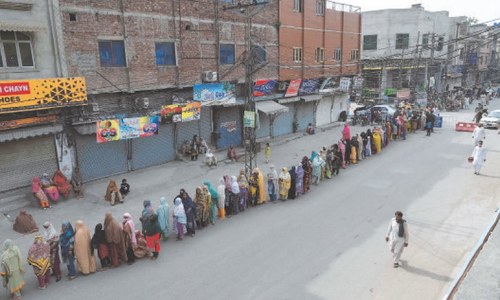AMID unfolding challenges to the country’s social and macroeconomic conditions following the Covid-19 pandemic, the political economy appears to be at centre stage.
On one hand, the scandalous exposition of sugar and wheat trades by the investigation agencies jolted the sitting government and generated a political storm. On the other side, point-scoring between the PPP’s Sindh government and PTI’s federal government made sure that politics remains one of the key considerations in decision making even in the time of natural calamities.
This progressed while various local and international agencies estimated Pakistan’s growth prospects falling to less than 1 per cent this year and its repercussions flowing into the next fiscal year, with job losses going beyond 12 million. Simultaneously on a smaller scale, the bulk of the record-high return entailing foreign portfolio investments flew out like a hurricane. To make up for the sudden gap, the authorities pitched requests for fresh bailouts from the lending community for well over $3 billion loans despite a record $4-5bn estimated savings in petroleum imports.
A fresh controversy came to the fore when the Sindh government prepared a draft ordinance – Sindh Covid-19 Emergency Relief Ordinance, 2020 – under Article 128 of the constitution that the centre thought trespasses its constitutional powers and jurisdictions.
A fresh controversy came to the fore when the provincial government prepared the Sindh Covid-19 Emergency Relief Ordinance that the centre thought trespasses its jurisdictions
The draft provincial law made binding on educational institutions to cut their fees by straight 20pc, on all private businesses to protect their workers from any layoff or pay cut and set a schedule for waiver of private sector house rents.
But the provincial government appears to be testing constitutional limits when it said all the utility providers falling within the territorial jurisdiction of the government of Sindh shall provide concession as per an attached schedule in the utility services to all the domestic, residential and commercial consumers.
There have always been debates on common and individual rights and powers of the centre and the provinces over the subject of electricity and gas as per various provisions in the constitution. Here, the draft law talked about electricity and gas utilities which currently belongs to the federal government.
The draft law envisaged no payments of electricity bills for monthly consumption up to 260 units, followed by 25pc bill payment for 261-350 units, 50pc for 351-450 units and 100pc bill recovery for over 450 units.
Likewise, gas bill consumption of up to 155 cubic metres was exempt from payment, followed by 25pc payment for up to 200 cubic metres per month, 50pc for 300 units and 100pc for 300 units and above.
This apparently covered power utilities such as Sukkur and Hyderabad Electric Companies, gas utility Sui Southern Gas Company and private power utility K-Electric for which the centre is separately putting in place relief measures. At best, the decision making for such entities should flow from common forums like the Council of Common Interests.
The Ministry of Energy attacked the draft provincial law and blamed the provincial government for exceeding its limits. “Bills for electricity and gas supplied by federal entities are in the federal domain and the provincial government cannot legislate upon such subjects”, said the Ministry of Energy in a public statement.
It said the federal government was fully cognisant of the difficulties arising for the common consumers because of Covid-19 and had taken appropriate steps including instalments for all consumers of up to 300 units of electricity for three months and three monthly instalments for gas bills up to Rs2000.
In also wrote follow up letters to the provincial government through the chief secretary asking it to refrain from such advances and noted the move appeared to be meant as a cheap publicity stunt.
The centre also reminded the provincial government that besides the relief in the energy sector, the federal government has launched the Ehsaas Programme that will give Rs12,000 to 12m eligible families involving an amount of Rs144bn. “If the Sindh government wants to provide additional relief to the people of Sindh it should do so using its own resources and not to take any unconstitutional steps,” it added.
This came on a day the centre approved a Rs300bn bailout package for the power sector to settle immediate liabilities. This meant that about Rs200bn Islamic Sukuk being raised originally for the retirement of stock of the circular debt would now be used to meet immediate cash shortfalls — fresh flow to the circular debt – of the power sector arising out of the deferment of the fuel price adjustment and quarterly tariff adjustment until June this year.
The cost of deferment of the fuel price adjustment was estimated at Rs61bn while a delay in the recovery of quarterly tariff adjustments would cost Rs77bn. About Rs60bn would be paid to fuel suppliers and banks for the retirement of the debt. A fresh Rs100bn Syndicated Term Finance Facility has also been authorised for short-term borrowing of 9-12 months from commercial banks to bridge the fiscal gap to be caused by stretching out the recovery of electricity bills of consumers using less than 300 units per month from three months to nine months.
As if that was not enough, the recovery of bills by distribution companies has also plunged to 62-63pc in March from 91-92pc in February because of the closure of commerce and industry across the country. The power companies are estimated to face a loss of about Rs10bn electricity units until June but capacity payments would become due to the power plants. To meet this additional fiscal gap, the power division is seeking Rs67bn out of the Prime Minister’s Emergency Fund in three equal monthly instalments of about Rs22bn.
Published in Dawn, The Business and Finance Weekly, April 13th, 2020














































